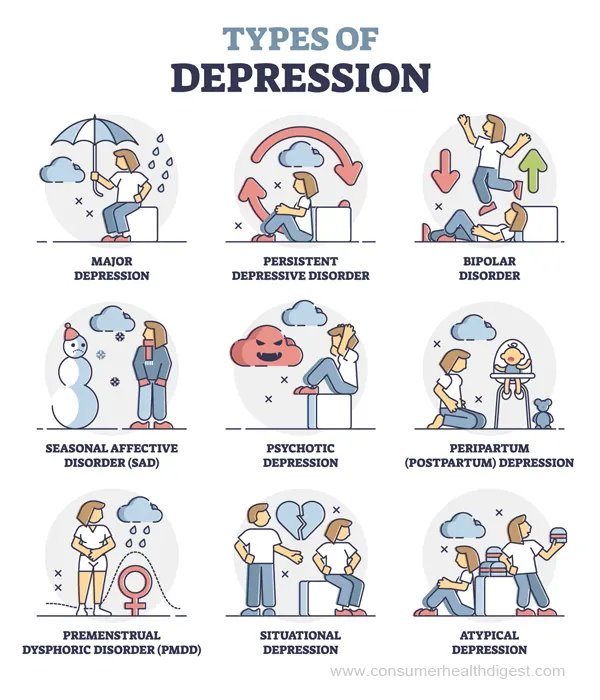Understanding Depression: More Than Just Feeling Down
Depression, often perceived as a transient shadow of sadness by many, is in reality a significant and pervasive mood disorder that profoundly affects an individual's feelings, thoughts, and daily functions.

It is more than just the blues or a series of bad days; it is a deep-seated state of despondency that steals away the joy of life and leaves a person struggling to find pleasure in activities once enjoyed. The essence of understanding depression lies in recognizing its complexity and the serious impact it has on lives.
According to the Centers for Disease Control and Prevention, a staggering 18.5 percent of American adults experienced symptoms of depression over a 2-week period in 2019. [1]
This mood disorder can manifest through a spectrum of emotional and physical symptoms, from persistent sadness and a loss of interest in life to significant changes in sleep, appetite, and energy levels.
Far from being an isolated feeling of sadness, depression encompasses a range of symptoms that can also exacerbate chronic health conditions like arthritis, asthma, cardiovascular disease, and more. Recognizing the signs and seeking timely help is vital for effective management and recovery. Unlike the natural ebb and flow of emotions in response to life's challenges, depression is a constant companion that requires understanding, support, and, most importantly, treatment.
Recognizing the Symptoms:
Depression manifests through a constellation of symptoms, not just one or two. The two core symptoms are:
- Feeling sad or having a depressed mood most of the day, nearly every day. This sadness goes beyond the occasional blues and feels overwhelming and all-consuming.
- Loss of interest or pleasure in activities once enjoyed. Activities that once brought joy become a chore, and the individual loses motivation to participate.
However, depression exhibits itself through various other symptoms as well, some of which include:
- Changes in appetite or weight (significant weight loss or gain without trying)
- Difficulty sleeping or sleeping too much (insomnia or hypersomnia)
- Loss of energy or increased fatigue, feeling drained even after resting
- Difficulty concentrating, remembering, or making decisions, experiencing indecisiveness and forgetfulness
- Restlessness or feeling slowed down, exhibiting physical agitation or slowed movements
- Feelings of worthlessness or guilt, having a persistent negative self-image and blaming oneself for everything
- Recurrent thoughts of death or suicide, feeling hopeless and contemplating ending one's life
It's important to note that everyone experiences sadness and occasional loss of interest in activities. However, when these symptoms persist for two weeks or more and significantly impact daily life, it's crucial to consider the possibility of depression.
Beyond Sadness: A Multifaceted Experience
Depression manifests differently in individuals. While some experience persistent sadness, others may primarily struggle with feelings of worthlessness, guilt, or hopelessness. [2] Physical symptoms like fatigue, changes in appetite, and sleep disturbances can also be prominent. This spectrum of symptoms highlights the varied ways depression affects people.
Understanding the Causes of Depression:

Causes of Depression. Shutterstock Image
While the exact cause of depression remains unknown, it's believed to be a complex interplay of various factors, including: [3]
- Biological factors: Brain chemistry, genetics, and hormonal imbalances can play a role in the development of depression.
- Psychological factors: Negative thinking patterns, low self-esteem, and past traumatic experiences can contribute to depression.
- Social factors: Stressful life events (e.g., job loss, relationship problems), social isolation, and lack of support systems can increase the risk of depression.
It's essential to remember that depression isn't a weakness or something to be ashamed of. It's a treatable condition, and seeking professional help is crucial for managing and overcoming it.
Who Can Be Affected by Depression?
While factors like gender and life stage may increase vulnerability, it's crucial to remember that depression doesn't discriminate. Anyone can experience it, regardless of age, gender, ethnicity, or socioeconomic background.
Here are some groups that may be at a higher risk:
- Women: According to research, women are statistically more likely than men to experience depression, particularly during pregnancy and postpartum due to hormonal changes and the demands of caring for newborns. [4]
- Elderly individuals: Social isolation, loneliness, and a lack of purpose can increase the risk of depression in older adults.
- Individuals facing financial difficulties: Financial hardship and stress can be significant triggers for depression.
Depression Association of America (ADAA), most people get depressed after loss of loved ones, job loss and divorce stating that the feelings are normal to stressing factors in life. Unfounded depressive illnesses can be traced in genetics in cases where you inherit the condition from your parents. However, the chance of a family member inheriting depression is usually one out of six. [5]
Seeking Help: Your Steps Towards Recovery:

How to Recover From Depression? Shutterstock Image
Early intervention is vital for effectively managing depression. If you suspect yourself or someone you know might be struggling with depression, seeking help is the most important step towards recovery. Here's why it's important: [6]
- Early intervention can prevent symptoms from worsening and becoming more difficult to manage.
- Professional help can provide effective treatment options, such as therapy and medication, tailored to your specific needs.
- Seeking help can offer support and guidance, empower you to manage your condition, and improve your overall well-being.
Treatment options for depression include:
- Therapy: Talk therapy modalities like cognitive behavioral therapy (CBT) can help individuals identify and manage negative thinking patterns, develop coping skills, and improve overall well-being. [7]
- Medication: Antidepressant medications can help regulate brain chemistry and improve symptoms, enhancing the effectiveness of therapy.
Various resources are available to help you on your journey towards recovery. These include:
- Mental health professionals: Therapists, psychologists, and psychiatrists can provide various treatment options and support.
- Mental health hotlines: These helplines offer immediate support and can connect you with resources in your area.
- Support groups: Connecting with others who understand what you're going through can provide invaluable support and encouragement.
The Dangers of Untreated Depression
Untreated depression can lead to several challenges, impacting various aspects of our lives. Here are some of the potential dangers:
- Increased risk of self-harm and suicide: Depression can lead to feelings of hopelessness and despair, making individuals more vulnerable to thoughts and actions of self-harm or even suicide. It's essential to seek help if you or someone you know is struggling with these thoughts. [8]
- Addiction tendencies: In an attempt to cope with the emotional pain of depression, some individuals may turn to alcohol, drugs, or other harmful substances for self-medication. This can lead to addiction, further complicating the situation.
- Strained relationships: Depression can affect our ability to connect with loved ones. The emotional toll and withdrawal symptoms can create distance and conflict in relationships.
- Physical health consequences: Depression can manifest in physical ways, impacting sleep patterns, appetite, and energy levels. Over time, it can even increase the risk of certain health problems.
- Academic and professional struggles: Difficulty concentrating, staying motivated, and making decisions can hinder academic performance or work productivity. This can lead to frustration and a sense of failure, further fueling the cycle of depression.
Different Types of Depression

Types of Depression. Shutterstock Image
Depression manifests differently in individuals, and there are various forms beyond the common types. Here's a brief overview:
- Major Depression: This is a well-known form characterized by persistent sadness, loss of interest, and changes in sleep and appetite. It can be a recurring condition, but seeking help is crucial for managing it. [9]
- Chronic Depression (Dysthymia): This type involves long-lasting (over two years) low-grade depression. Often misconstrued as personality traits, its symptoms can worsen, leading to withdrawal and suicidal thoughts.
- Atypical Depression: This form presents with typical depression symptoms, but individuals may experience improved moods after positive events, increased appetite, and excessive sleep. It's more common in younger individuals.
- Postpartum Depression(PPD): This affects women and sometimes new fathers after childbirth. It involves mood swings and short-lived crying spells, but persistent symptoms can signal PPD. Triggers include delivery complications, but not all women who experience difficulties during childbirth will develop it.
- Bipolar Depression (Manic Depression): People with this type experience cycles of mania (elevated mood, increased energy) and depression. During mania, they may display erratic behavior, poor judgment, and sleep deprivation. Both manic episodes can occur simultaneously and last for days or months.
- Seasonal Affective Disorder (SAD): Individuals with SAD experience depression during specific seasons, like winter months, due to decreased sunlight exposure. Symptoms include low mood and decreased productivity. Light therapy and medication can help manage it.
- Psychotic Depression: This is a severe form of major depression with psychotic symptoms like hallucinations (seeing or hearing things that aren't there) and delusions (false beliefs). It requires professional help due to its complex nature.
- Situational Depression: This arises due to difficulty coping with life changes, such as losing a loved one, moving homes, or experiencing a stressful event. It's temporary and usually resolves once individuals adjust to the changes.
- Endogenous Depression: This is believed to be caused by internal factors like brain chemistry imbalances and may have a genetic link. It affects sleep, appetite, and sex drive.
Living with Hope and Taking Action:
Depression might seem overwhelming, but it's important to remember that you're not alone. Millions of people worldwide manage depression effectively, and you can too. The key is to understand the condition, recognize the signs, and take action by seeking help from qualified professionals. Remember, depression is treatable, and with the right support and resources, you can reclaim your life and experience joy once again.
Remember: You are not alone. Millions of people share this experience, and there is hope for a brighter future. By taking the courageous step towards getting help, you can overcome the challenges of depression and rediscover your strength and well-being.
9 Sources
We review published medical research in respected scientific journals to arrive at our conclusions about a product or health topic. This ensures the highest standard of scientific accuracy.
[2] "Depression." National Institute of Mental Health (NIMH), 11 Mar. 2024, www.nimh.nih.gov/health/topics/depression.
[3] website. "Causes - Depression in adults." Nhs, 11 July 2023, www.nhs.uk/mental-health/conditions/depression-in-adults/causes.
[4] "Depression Among Women | CDC." 26 Sept. 2023, www.cdc.gov/reproductivehealth/depression/index.htm.
[5] "What is Depression? | Anxiety and Depression Association of America, ADAA." 10 Mar. 2024, adaa.org/understanding-anxiety/depression.
[6] "Help for Mental Illnesses." National Institute of Mental Health (NIMH), 11 Mar. 2024, www.nimh.nih.gov/health/find-help.
[7] Gautam M, Tripathi A, Deshmukh D, Gaur M. Cognitive Behavioral Therapy for Depression. Indian J Psychiatry. 2020 Jan;62(Suppl 2):S223-S229. doi: 10.4103/psychiatry.IndianJPsychiatry_772_19. Epub 2020 Jan 17. PMID: 32055065; PMCID: PMC7001356.
[8] Motillon-Toudic C, Walter M, Séguin M, Carrier JD, Berrouiguet S, Lemey C. Social isolation and suicide risk: Literature review and perspectives. Eur Psychiatry. 2022 Oct 11;65(1):e65. doi: 10.1192/j.eurpsy.2022.2320. PMID: 36216777; PMCID: PMC9641655.
[9] "Persistent Depressive Disorder (Dysthymic Disorder)." National Institute of Mental Health (NIMH), 11 Mar. 2024, www.nimh.nih.gov/health/statistics/persistent-depressive-disorder-dysthymic-disorder.







 This article changed my life!
This article changed my life! This article was informative.
This article was informative. I have a medical question.
I have a medical question.
 This article contains incorrect information.
This article contains incorrect information. This article doesn’t have the information I’m looking for.
This article doesn’t have the information I’m looking for.